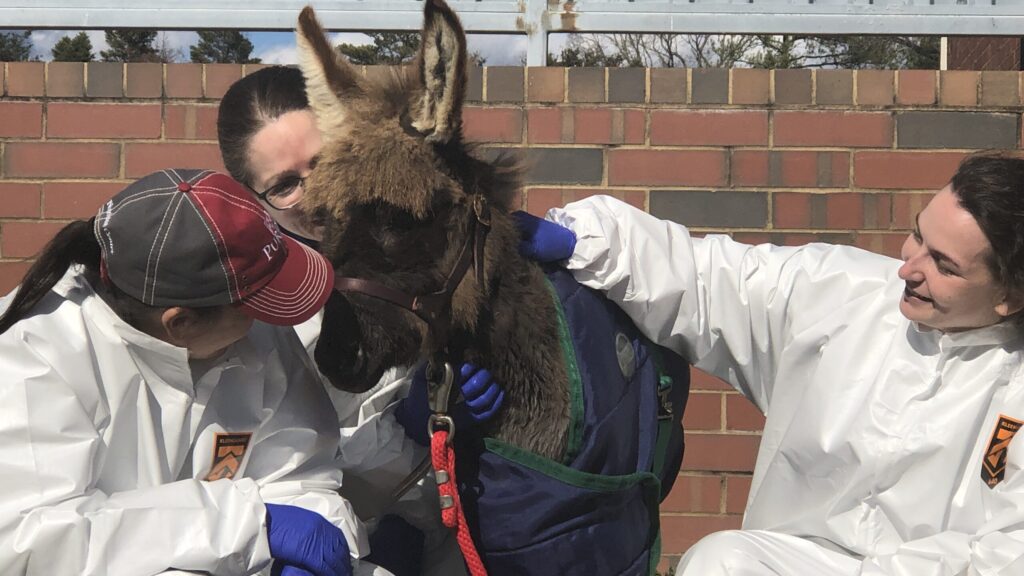From Praying to Braying: Donkey’s Cascade of Crises Doesn’t Faze Care Team
Elf survived a potentially deadly situation because of the problem-solving and compassionate care of NC State’s exceptional equine experts.
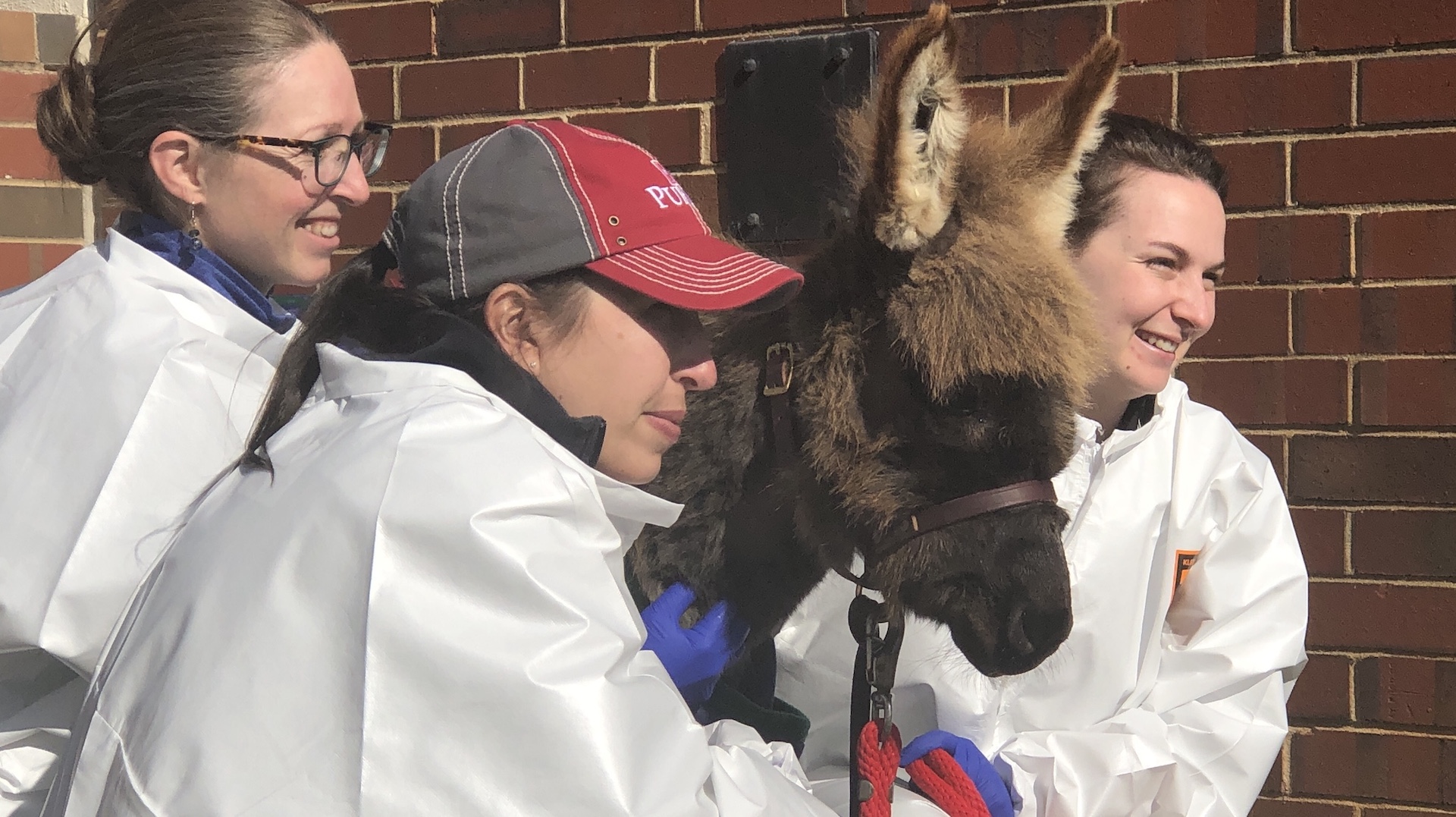
When nearly everything that can go wrong does go wrong, Elf the very sick donkey and his persistent and grateful owner learned that the NC State College of Veterinary Medicine is exactly the right place to be.
Through Elf’s pneumonia, severe diarrhea, bacterial infection, viral infection, autoimmune response to plasma and several rectal prolapses, the NC State Veterinary Hospital equine department stayed steady. The team that included an assistant professor, an equine internal medicine resident, an experienced equine technician and two fourth-year students worked relentlessly to save little Elf, whom owner Shana Martin now calls her phoenix.
Dire was the situation when Elf arrived at the veterinary hospital’s equine emergency department late on a Saturday evening in early January.
His heart rate was 120, double the normal rate. His mucus membranes were purple. His ears and legs were ice cold. All of the signs pointed to extremely poor blood perfusion, meaning his oxygen delivery was catastrophically low. The prognosis for the 110-pound brown boy with the bushy blond bangs was poor.
“He was very, very sick, very dehydrated, with lots of diarrhea,” remembers Dr. Breanna Sheahan, assistant professor of equine medicine. “His blood work was abnormal. He had all the things that can happen with diarrhea, including decreased proteins and electrolytes. The emergency team started him on intensive treatments including a plasma transfusion, antibiotics and fluids, attempting to stabilize him. However, he didn’t really respond.”
Martin, an Emerald Isle, North Carolina, resident, had bought Elf and his sibling Mistletoe at a livestock auction before Christmas. Martin and her husband are building an equine rescue farm in Kentucky this year and already have saved 16 Belgian horses and seven hound dogs as well.
While the 5-month-old donkeys were quarantined – a normal procedure before they could head to the boarding facility Martin had acquired for them – a local veterinarian went out to examine and vaccinate them. When the veterinarian found both animals with severe pneumonia, she sent them at Martin’s request to a local animal hospital.
“Mistletoe recovered nicely, but Elf was just progressing the other way,” Martin says.
The antibiotics that helped Mistletoe actually started Elf down a path toward doom, destroying his good gastrointestinal tract microbes and causing endless diarrhea. The local veterinarian told Martin that nothing else could be done at the hospital and suggested she take him to NC State Veterinary Hospital.
“I thought, there has to be something you can do,” Martin says. “There has to be. I’m not a quitter.”
Martin enlisted the help of the auction owner to transport Elf an hour and a half to NC State and asked the equine emergency team members what they could do.
“They said, ‘What we can do is try our hardest,’ and that’s what we did,” Sheahan says.
‘He was very likely to die’
The on-call emergency equine team put Elf in isolation and got him stabilized then Sheahan and Dr. Kimberly Hallowell, a second-year internal medicine resident, took over the case with the help of Karie Tucker, an NC State equine technician for two decades, and two veterinary students completing their fourth-year clinical rotations.
Tests showed that, in addition to pneumonia, Elf was suffering from a virus and an overgrowth of Clostridium difficile, a bacteria that can live without incident in the GI tract but dangerously proliferates in some animals treated with antibiotics.
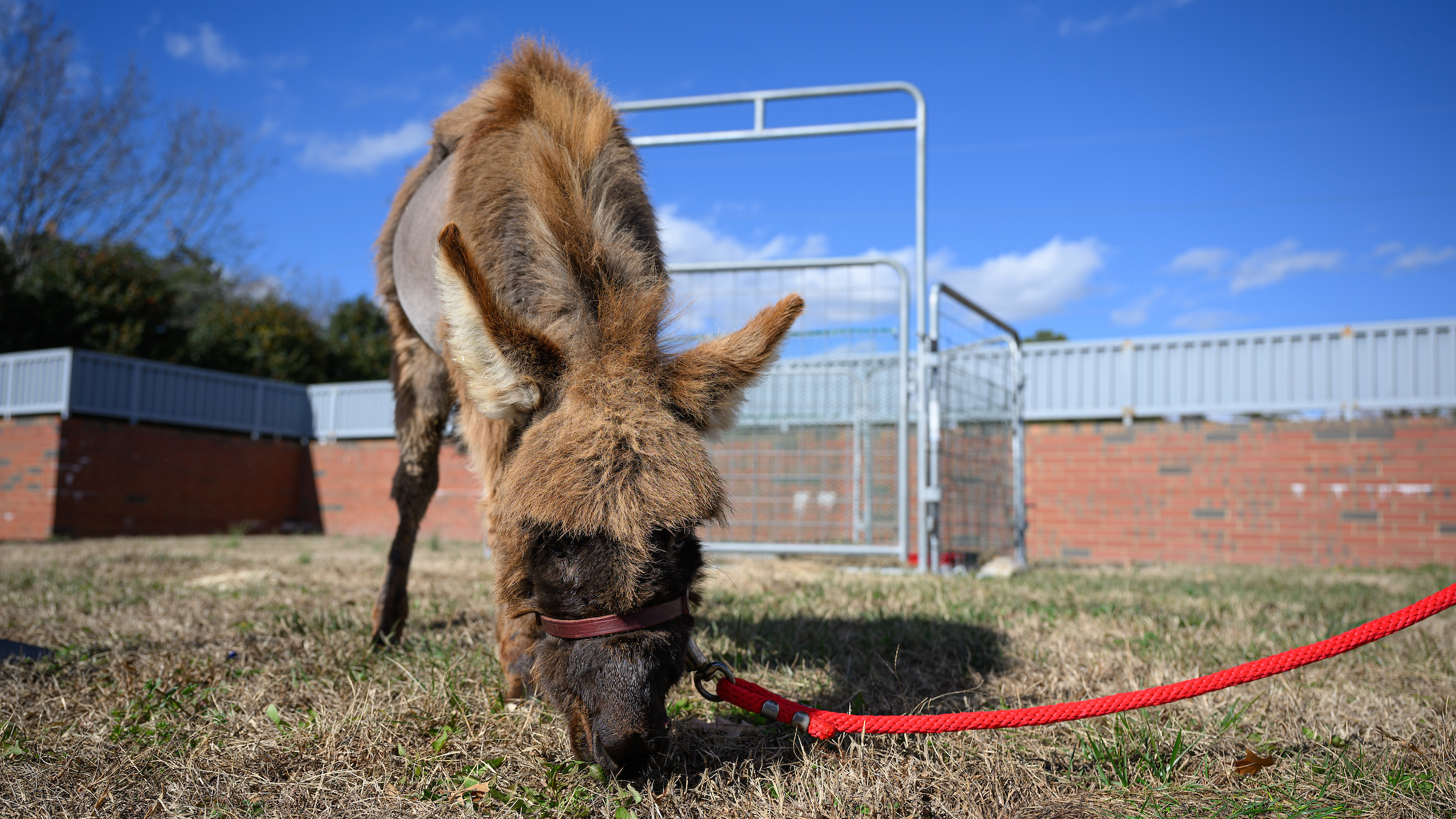
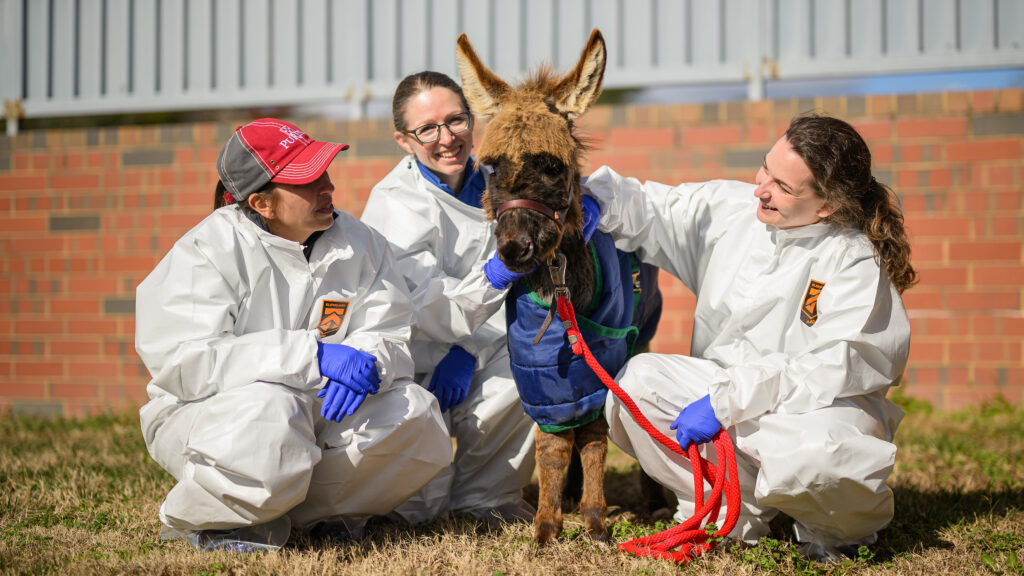
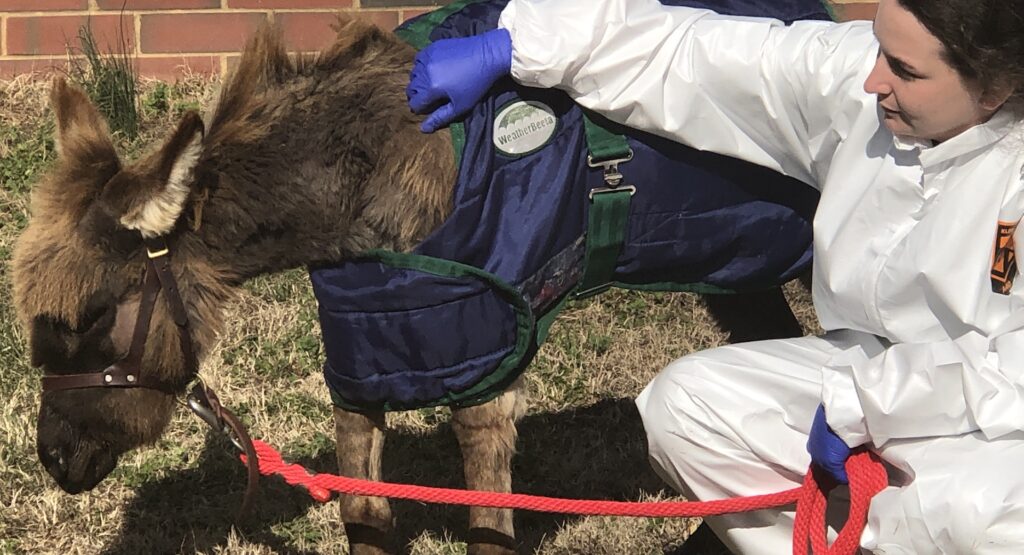
“Using ultrasound, we looked at his colon, and it was really concerning because he had gas production within the wall of the intestines,” recalls Sheahan, whose research lab at NC State focuses on equine gastrointestinal disease. “There should be no gas there. It indicates that he had bacteria so deep in the wall of his intestine that they were in his tissues. That’s a pretty negative prognostic indicator. It told us he was very sick and very likely to die.”
C. diff, as the bacteria often are called, can cause extreme diarrhea that robs the bloodstream of needed fluids and can inflame the colon so much that no nutrients get absorbed.
“I called Mom,” Hallowell says, referring to Martin. “I said, ‘He’s very sick and the odds of not surviving are very high. But if you want to pursue treatment, we’ll fight for him. We’ll take it 12 hours at a time, and as long as you’re game to continue and he’s responding, then we’ll fight for him.’ ”
Martin, for her part, was never going to give up. Her passion is saving the sickest of the sick. Elf was just a sweet baby, and he deserved a chance to live, she says.
Sheahan and Hallowell put Elf on intravenous antibiotics to better combat the C. diff in Elf’s tissues and a continuous plasma infusion to maintain perfusion.
“We gave this little donkey his entire blood volume in plasma four or five times over,” Hallowell says. “But it was the only way to keep his blood volume up and to maintain circulation.”
During his 31-day stay, Elf’s care team expanded to include NC State nutritionists, anesthesiologists and surgeons.
Dr. Korinn Saker, one of fewer than 100 board-certified veterinary nutritionists in the country, devised an intravenous nutrition plan based entirely on the sick animal’s own needs.
“We started his IV nutrition that included lipids, amino acids, sugars and all of those things he needs while his GI tract is so inflamed nothing can get across that barrier,” says Sheahan, who received her DVM from the University of California-Davis and a Ph.D. from NC State. “IV nutrition helps him stay alive while he heals his gut.”
The anesthesia team put together a pain-management plan for Elf that included an epidural, and he started to look a bit brighter. His feet were not ice cold for the first time in days. His legs were warm, and his GI tract started working again.
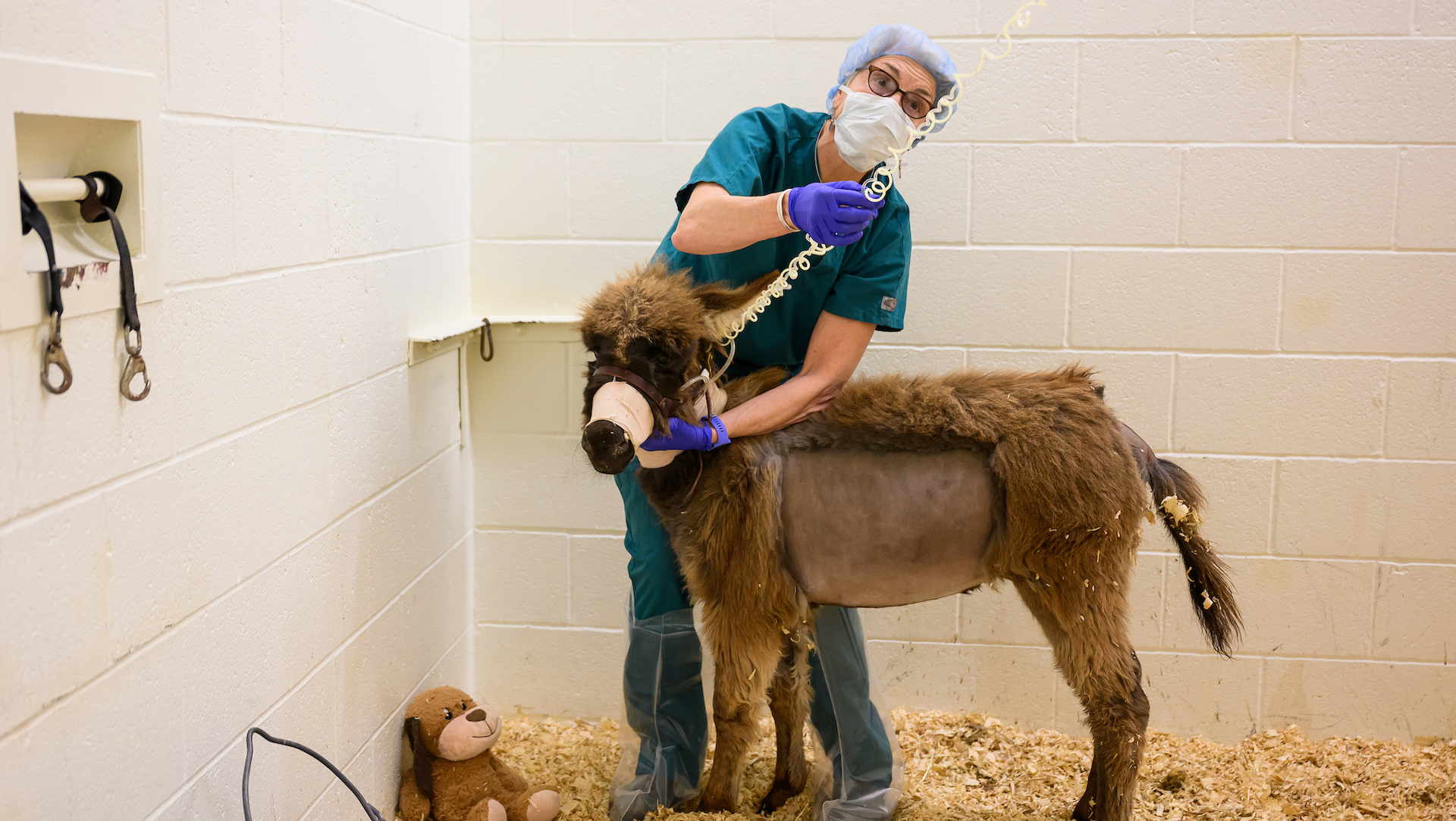
But then.
“Every day there was a new complication,” says Hallowell, a DVM graduate of Tufts University in Massachusetts. “If X, Y and Z were better, now we have this new problem to fix. We would weigh what are the risks and what are the chances Elf gets this complication? And we realized, even if no one else would, he would.”
Elf started passing blood in his diarrhea.
“All of the lining of the gut was just shedding off,” Sheahan says, “and then we worried he would have severe hemorrhaging from the GI tract because he was so sick.”
Bring in the surgeons
Because he was experiencing so much diarrhea, Elf suffered a rectal prolapse, which the surgical team repaired. Next, his blood work started to show that he was having a delayed immune reaction to the donor plasma, attacking his own red blood cells and platelets.
“We started him on steroids to limit the autoimmune response,” Sheahan says. “He responded really well to those. The hard thing is, we can support him as well as we can from a medical standpoint, but we can’t magically make his gut heal or stop the bleeding inside. All that just takes time.”
About eight days after Elf was admitted, he finally gave them a hopeful sign.
“He brayed at us,” Sheahan says with a smile. “I don’t know whether you’ve ever heard a donkey bray, but they are adorable.”
He started eating. He started interacting with his caregivers.
“He loves ear scritches,” Sheahan says, explaining that’s what she calls scratching a donkey’s inner ear. ”They can’t really scratch down inside with their long ears, and he realized that he quite liked that.”
Once Elf’s diarrhea was blood-free, they gave him a fecal transplant: a healthy horse’s manure administered through a tube into his stomach. With all of the mucosal lining of his gastrointestinal tract shedding, with the overgrowth of C. diff bacteria, and with all of the antibiotics the donkey had been given, Sheahan says they knew he didn’t have the normal gut bugs he needed to recover.
Three days later, Elf had normal manure and maintained that progress throughout the rest of his hospital stay.
“Elf’s story is really a story of how many people helped to save him,” Sheahan says. “Equine internal medicine primarily managed his case, but nutrition checked in every day, the anesthesia team helped us manage his discomfort, and the surgery team fixed his rectal prolapses.
“Every department in this hospital has helped this donkey live,” she says. “That’s what I love about this place. Whenever you have a question or a need, there is always someone to help you out. And that’s the beauty of being at a teaching hospital.”
Hallowell says she talked with Martin about Elf’s condition and progress every morning and night for more than three weeks.
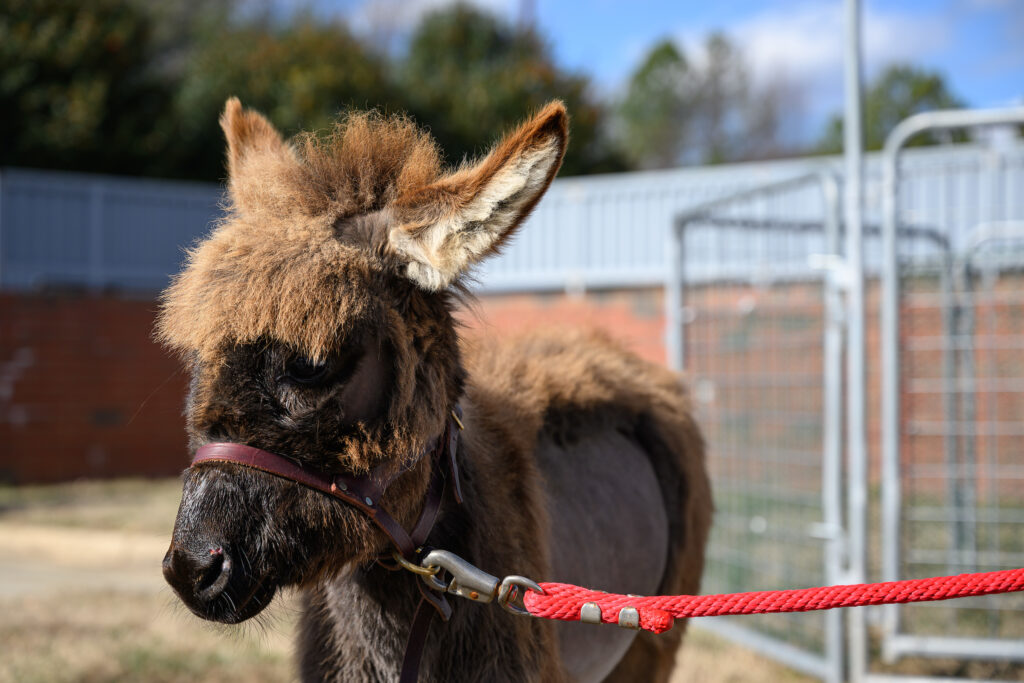
“One of my favorite things about the really sick ones is, all this time my conversations with her have been long, that this has happened and this might happen,” Hallowell says. “We spent the whole time talking about everything that’s wrong. Yesterday, I got to tell her that he’s the most stable patient in the barn now.”
With Elf firmly on the path to wellness, his medical team could reflect on all they had experienced on the dizzying donkey ride.
“It really made me, as an internist, stretch the boundaries, to think about the pathophysiology of what was going on,” Sheahan says. “Why is he having these bloodwork changes? What’s going on inside? How do we figure out a treatment plan to help without causing more problems? It’s the most difficult case I’ve had in a long time.”
‘Everything was a teaching moment’
Michelle Mordukhaev, a visiting DVM student from St. George’s University in Grenada, was one of the fourth-year students doing an equine clinical rotation during Elf’s most critical days. NC State has several students from offshore universities each year who complete their fourth-year hands-on clinical rotations in Raleigh.
“Despite all of the ailments, you can still break them down one by one and treat each and every issue,” Mordukhaev says, recounting what she learned from Elf. “As a student it feels overwhelming to be faced with a patient with so many problems, but NC State has such good clinicians who talk through everything with you, and the treatment plans and the prognosis become clearer.”
Mordukhaev praised how Sheahan and Hallowell included the students in running through the symptoms and the list of possibilities as Elf’s stay stretched on.
“They were there for all of it,” Mordukhaev says. “It wasn’t just students carrying out all the tasks for them. If something needed to be done, we all went down to the isolation barn together. Everything was a teaching moment.”
As for Martin, she will be forever grateful that she found a team of medical professionals who were willing to fight as hard as she was.
“I always have been someone who doesn’t give up. Ever,” she says. “The whole NC State team and staff were the same way with him, and I think it’s just amazing.”
Elf was discharged to rehab and soon will be reunited with Mistletoe, to whom Martin says he was very attached, at a boarding facility in North Carolina as Martin and her husband continue building what will become a nonprofit haven in Kentucky.
Phoenix Farm has always been what they were going to call their 125 acres in the heart of horse country. Now they know why, Martin says.
“Elf is here for a reason, a purpose, a big purpose,” she says. “Out of all the monstrous draft horses I have, that it would be my little donkey? Elf is now the center stage to it. He’s the miracle. He ’s the little fighter. He is the phoenix.”
